小学英语语法及练习题资料
小学生必须掌握的语法练习题
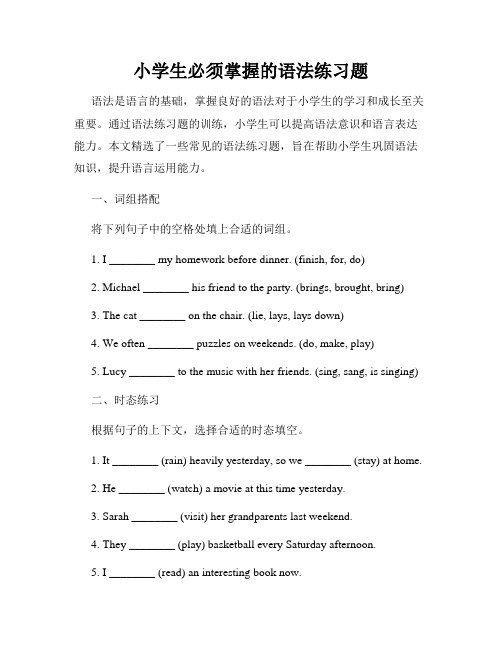
小学生必须掌握的语法练习题语法是语言的基础,掌握良好的语法对于小学生的学习和成长至关重要。
通过语法练习题的训练,小学生可以提高语法意识和语言表达能力。
本文精选了一些常见的语法练习题,旨在帮助小学生巩固语法知识,提升语言运用能力。
一、词组搭配将下列句子中的空格处填上合适的词组。
1. I ________ my homework before dinner. (finish, for, do)2. Michael ________ his friend to the party. (brings, brought, bring)3. The cat ________ on the chair. (lie, lays, lays down)4. We often ________ puzzles on weekends. (do, make, play)5. Lucy ________ to the music with her friends. (sing, sang, is singing)二、时态练习根据句子的上下文,选择合适的时态填空。
1. It ________ (rain) heavily yesterday, so we ________ (stay) at home.2. He ________ (watch) a movie at this time yesterday.3. Sarah ________ (visit) her grandparents last weekend.4. They ________ (play) basketball every Saturday afternoon.5. I ________ (read) an interesting book now.三、句型转换将下列句子进行句型转换,每空一词。
1. He goes to school by bus. (改为否定句)He ________ ________ to school by bus.2. They have finished their homework already. (改为一般疑问句) ________ they ________ their homework already?3. Jenny is playing the piano in the living room. (改为一般疑问句) ________ Jenny ________ the piano in the living room?4. She is going to buy a new dress. (改为否定句)She ________ ________ to buy a new dress.5. Tom can swim very well. (改为一般疑问句)________ Tom ________ swim very well?四、动词的正确形式根据句子意思,填入动词的正确形式。
小学英语系列训练材料:语法及练习9份(附答案)
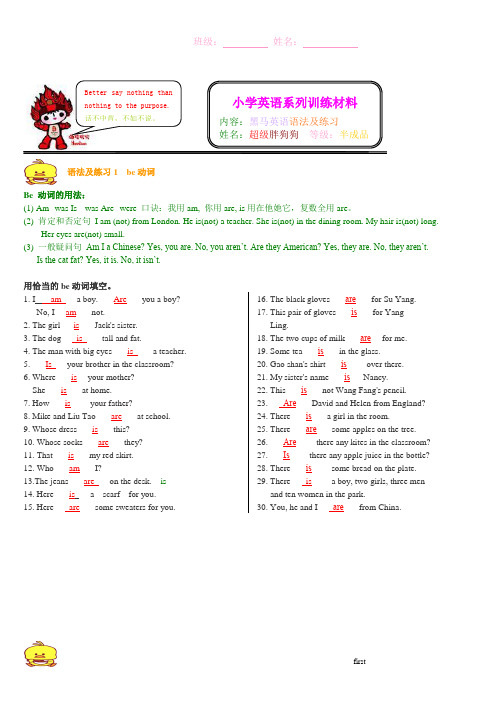
语法及练习1 be 动词Be 动词的用法:(1) Am--was Is --was Are--were 口诀:我用am, 你用are, is 用在他她它,复数全用are 。
(2) 肯定和否定句 I am (not) from London. He is(not) a teacher. She is(not) in the dining room. My hair is(not) long. Her eyes are(not) small.(3) 一般疑问句 Am I a Chinese? Yes, you are. No, you aren’t. Are they American? Yes, they are. No, they aren’t. Is the cat fat? Yes, it is. No, it isn’t.用恰当的be 动词填空。
1. I ___am___ a boy. ___Are ___ you a boy? No, I __am ___ not.2. The girl___is ___ Jack's sister.3. The dog ___is____ tall and fat.4. The man with big eyes ___is____ a teacher.5. ___Is___ your brother in the classroom?6. Where ___is __ your mother? She ___is ___ at home.7. How ___is ____ your father?8. Mike and Liu Tao ___are ___ at school.9. Whose dress ___is ___ this? 10. Whose socks ___are ___ they? 11. That ___is ___ my red skirt. 12. Who ___am ___ I? 13.The jeans ___are___ on the desk. is 14. Here ___is ___ a scarf for you. 15. Here ___are ___ some sweaters for you. 16. The black gloves ___are ___ for Su Yang. 17. This pair of gloves ___is ___ for Yang Ling. 18. The two cups of milk ___are __ for me. 19. Some tea ___is ___ in the glass. 20. Gao shan's shirt ___is ____ over there. 21. My sister's name ___is ___Nancy. 22. This ___is ___ not Wang Fang's pencil. 23. ___Are ___ David and Helen from England? 24. There ___is ___ a girl in the room. 25. There ___are ___ some apples on the tree. 26. ___Are ____ there any kites in the classroom? 27. ___Is ____ there any apple juice in the bottle? 28. There ___is ____ some bread on the plate. 29. There ___is ____ a boy, two girls, three men and ten women in the park. 30. You, he and I ___are ___ from China.语法及练习2 人称代词和物主代词人称代词和物主代词1.人称代词主格和宾格的区别:主格通常位于句中第一个动词之前(有时候位于than 之后),宾格一般位于动词或介词之后。
小学英语语法练习题及答案

小学英语语法练习题及答案一、单项选择题1. — ______ does your father go to work?— He goes to work by car.A. HowB. WhenC. WhereD. Why2. My friend and I _______ to the park last Sunday.A. goB. wentC. goesD. is going3. _______ two pencils on the desk.A. There'sB. ThereC. They'reD. Here4. Helen ________ carrots and tomatoes for dinner.A. likeB. likesC. is likingD. liked5. _______ any milk in the fridge?A. There isB. Is thereC. There areD. Are there二、完形填空题John and Lisa are brother and sister. They are from the United States. They 1 a small garden. 2 garden is behind their house. In the garden, there 3 a big tree, some flowers, and a pond. Every 4 John and Lisa play in their garden. They 5 a lot of fun there.One day, they saw 6 small bird near the pond with a broken wing. The bird 7 fly away. John and Lisa 8 the bird and put it in a small box. They gave the bird some food and water. They wanted 9 bird to get better.Every day, John and Lisa took care of the bird. They talked 10 it and sang songs to it. After a few weeks, the bird's wing 11 better. It was 12 to fly again. John and Lisa opened the box and the bird flew away happily.John and Lisa were very happy 13 they helped a little bird. They loved animals and wanted to take care 14 them. They knew that everyone could 15 a small part to make the world a better place.1. A. has B. have C. had D. having2. A. Their B. They C. Them D. Theirs3. A. are B. is C. was D. were4. A. day B. night C. week D. morning5. A. is having B. has C. have D. had6. A. the B. a C. an D. and7. A. can't B. couldn't C. can D. could8. A. took care of B. took care C. take care of D. are taking care of9. A. a B. an C. the D. /10. A. to B. about C. with D. on11. A. gets B. got C. get D. getting12. A. able B. not able C. couldn't D. can't13. A. if B. because C. when D. while14. A. from B. for C. about D. of15. A. do B. did C. does D. doing三、阅读理解题ADear Sarah,How are you? I hope you are doing well. I am writing to tell you about my trip to Beijing. Beijing is the capital city of China. It is a very big and beautiful city.I visited the Great Wall. It was amazing! The Great Wall is very long and old. We took many photos there. I also went to the Summer Palace. It is a big park with a lake. We took a boat on the lake. It was so much fun!The food in Beijing was delicious. I tried Peking duck. It was very tasty.I also bought some souvenirs for you. I hope you like them.I miss you a lot. Don't forget to write back and tell me about your summer vacation.Love,Amy1. Where did Amy go on her trip?A. ShanghaiB. BeijingC. Hong KongD. Guangzhou2. What did Amy think of the Great Wall?A. BeautifulB. BoringC. SmallD. New3. What did Amy do at the Summer Palace?A. Took a boat on the lakeB. Climbed a mountainC. Visited a museumD. Took many photos4. What did Amy eat in Beijing?A. RiceB. NoodlesC. Peking duckD. SushiBMy name is Tom. I am 11 years old. I live in London, England. I have two brothers and one sister. My brothers are older than me, and my sister is younger. We all go to the same school.My favorite subject in school is math. I like solving math problems. My least favorite subject is history. I think it's boring.In my free time, I like playing soccer with my friends. I am on the school soccer team. We practice every Tuesday and Thursday after school. We have matches on Saturdays.I also enjoy reading books. My favorite book is Harry Potter. I have read all the books in the series. I like the adventures of Harry and his friends.1. How old is Tom?A. 10B. 11C. 12D. 132. What is Tom's favorite subject in school?A. MathB. EnglishC. HistoryD. Science3. How often does Tom practice soccer with his team?A. Every dayB. Every Monday and WednesdayC. Every Tuesday and ThursdayD. Every Saturday4. What is Tom's favorite book?A. Alice in WonderlandB. Charlotte's WebC. Harry PotterD. Matilda答案:一、单项选择题:1. A 2. B 3. C 4. B 5. B二、完形填空题:1. B 2. A 3. B 4. A 5. C 6. C 7. B 8. A 9. A 10.B 11. B 12. A 13.C 14.D 15. A三、阅读理解题:A: 1. B 2. A 3. A 4. C B: 1. B 2. A 3. C 4. C。
最新PEP小学英语语法要点及练习题资料整理资料

精品文档PEP小学英语语法要点及练习题资料整理一、名词复数规则1.一般情况下,直接加-s,如:book-books, bag-bags, cat-cats, bed-beds2.以s. x. sh. ch 结尾,加-es, 如:bus-buses, box-boxes, brush-brushes, watch-watches3.以“辅音字母+y” 结尾,变y 为i,再加-es,如:family-families, strawberry-strawberries4.以“f或fe”结尾,变f或fe为v,再加-es,如:knife-knives5.不规则名词复数:man-men, woman-women, policeman-policemen, policewoman-policewomen, mouse-mice child-children foot-feet,.tooth-teethfish-fish, people-people, Chinese-Chinese, Japanese-Japanese写出下列各词的复数I him this ___ her _____watch child photo ___ diary _____day ____ foot ______ _ book ___ __ dress ______tooth _ _____ sheep_______box _____ _ strawberry ___thief yo-yo peach sandwichman_ __ woman ____ __ paper __ juice water milk ___ rice __ tea二、一般现在时.写出下列」动词的第三人称单数drink go _ stay ____ __ make ______ look _ ______ have ____ ___ pass ___ ___ carry ____come _ _____ watch_ plant flystudy _ brush ___ do ___ teach二、用括号内动词的适当形式填空。
小学英语六年级总复习语法及练习题一
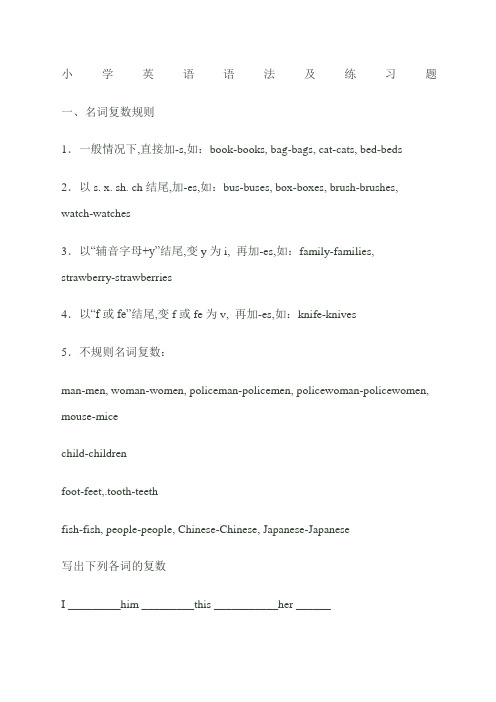
小学英语语法及练习题一、名词复数规则1.一般情况下,直接加-s,如:book-books, bag-bags, cat-cats, bed-beds 2.以s. x. sh. ch结尾,加-es,如:bus-buses, box-boxes, brush-brushes, watch-watches3.以“辅音字母+y”结尾,变y为i, 再加-es,如:family-families, strawberry-strawberries4.以“f或fe”结尾,变f或fe为v, 再加-es,如:knife-knives5.不规则名词复数:man-men, woman-women, policeman-policemen, policewoman-policewomen, mouse-micechild-childrenfoot-feet,.tooth-teethfish-fish, people-people, Chinese-Chinese, Japanese-Japanese写出下列各词的复数I _________him _________this ___________her ______watch _______child _______photo ________diary ______day________ foot________ book_______ dress ________tooth_______ sheep ______box_______ strawberry _____thief _______yo-yo ______ peach______ sandwich ______man______ woman_______ paper_______ juice___________water________ milk________ rice__________ tea__________二、一般现在时一般现在时基本用法介绍No. 1一般现在时的功能1.表示事物或人物的特征、状态;如:The sky is blue.天空是蓝色的;2.表示经常性或习惯性的动作;如:I get up at six every day.我每天六点起床;3.表示客观现实;如:The earth goes around the sun.地球绕着太阳转;一般现在时的构成1. be动词:主语+beam,is,are+其它;如:I am a boy.我是一个男孩;2.行为动词:主语+行为动词+其它;如:We study English.我们学习英语;当主语为第三人称单数he, she,it时,要在动词后加"-s"或"-es";如:Mary likes Chinese.玛丽喜欢汉语;一般现在时的变化1. be动词的变化;否定句:主语+ be + not +其它;如:He is not a worker.他不是工人;一般疑问句:Be +主语+其它;如:-Are you a student-Yes. I am. / No, I'm not.特殊疑问句:疑问词+一般疑问句;如:Where is my bike2.行为动词的变化;否定句:主语+ don't doesn't +动词原形+其它;如:I don't like bread.当主语为第三人称单数时,要用doesn't构成否定句;如:He doesn't often play.一般疑问句:Do Does +主语+动词原形+其它;如:- Do you often play football- Yes, I do. / No, I don't.当主语为第三人称单数时,要用does构成一般疑问句;如:- Does she go to work by bike- Yes, she does. / No, she doesn't.特殊疑问句:疑问词+一般疑问句;如:How does your father go to work 动词+s的变化规则1.一般情况下,直接加-s,如:cook-cooks, milk-milks2.以s. x. sh. ch. o结尾,加-es,如:guess-guesses, wash-washes,watch-watches, go-goes3.以“辅音字母+y”结尾,变y为i, 再加-es,如:study-studies一般现在时用法专练:一、写出下列动词的第三人称单数drink ________ go _______ stay ________ make ________look _________ have_______ pass_______ carry ____ come________ watch______ plant_______ fly ________ study_______ brush________ do_________ teach_______二、用括号内动词的适当形式填空;1. He often ________have dinner at home.2. Daniel and Tommy _______be in Class One.3. We _______not watch TV on Monday.4. Nick _______not go to the zoo on Sunday.5. ______ they ________like the World Cup6. What _______they often _______do on Saturdays7. _______ your parents _______read newspapers every day8. The girl _______teach us English on Sundays.9. She and I ________take a walk together every evening.10. There ________be some water in the bottle.11. Mike _______like cooking.12. They _______have the same hobby.13. My aunt _______look after her baby carefully.14. You always _______do your homework well.15. I _______be ill. I’m staying in bed.16. She _______go to school from Monday to Friday.17. Liu Tao _______do not like PE.18. The child often _______watch TV in the evening.19. Su Hai and Su Yang _______have eight lessons this term.20. -What day _______be it today-It’s Saturday.三、按照要求改写句子1. Daniel watches TV every evening.改为否定句___________________________________________________2. I do my homework every day.改为一般疑问句,作否定回答________________________________________________________ 3. She likes milk.改为一般疑问句,作肯定回答___________________________4. Amy likes playing computer games.改为一般疑问句,作否定回答___________________________________________________5. We go to school every morning.改为否定句_______________________________________________________ 6. He speaks English very well.改为否定句___________________________________________________7. I like taking photos in the park.对划线部分提问________________________________________________________ 8. John comes from Canada.对划线部分提问___________________________________________________9. She is always a good student.改为一般疑问句,作否定回答________________________________________________________ 10. Simon and Daniel like going skating.改为否定句___________________________________________________五、改错划出错误的地方,将正确的写在横线上1. Is your brother speak English __________________2. Does he likes going fishing __________________3. He likes play games after class. __________________4. Mr. Wu teachs us English. __________________5. She don’t do her homework on Sundays. _________________三、现在进行时1.现在进行时表示现在正在进行或发生的动作,也可表示当前一段时间内的活动或现阶段正在进行的动作;2.现在进行时的肯定句基本结构为be+动词ing.3.现在进行时的否定句在be后加not;4.现在进行时的一般疑问句把be动词调到句首;5.现在进行时的特殊疑问的基本结构为:疑问词不达意+ be + 主语+ 动词ing但疑问词当主语时其结构为:疑问词不达意+ be + 动词ing动词加ing的变化规则1.一般情况下,直接加ing,如:cook-cooking2.以不发音的e结尾,去e加ing,如:make-making, taste-tasting3.如果末尾是一个元音字母和一个辅音字母,双写末尾的辅音字母,再加ing,如:run-running, stop-stopping现在进行时专项练习:一、写出下列动词的现在分词:play________ run__________ swim _________make__________go_________ like________ write________ _ski___________read________ have_________ sing ________ dance_________put_________ see________ buy _________ love____________live_______ take_________ come ________ get_________stop_________ sit ________ begin________ shop___________二、用所给的动词的正确形式填空:1.The boy __________________ drawa picture now.2. Listen .Some girls _______________ singin the classroom .3. My mother _________________ cook some nice food now.4. What _____ you ______ do now5. Look . They _______________ have an English lesson .6.They ____________not ,water the flowers now.7.Look the girls ________________dance in the classroom .8.What is our granddaughter doing She _________listen to music.9. It’s 5 o’clock now. We _____________havesupper now10.______Helen____________wash clothes Yes ,she is .三、句型转换:1. They are doing housework .分别改成一般疑问句和否定句__________________________________________________________________________________________________________________________ 2.The students are cleaning the classroom . 改一般疑问句并作肯定和否定回答________________________________________________________________ _________________________________________________________________ _3.I’m playing the football in the playground .对划线部分进行提问________________________________________________________________ _4.Tom is reading books in his study . 对划线部分进行提问四、将来时理论及练习一、概念:表示将要发生的动作或存在的状态及打算、计划或准备做某事;句中一般有以下时间状语:tomorrow, next dayweek, month, year…,soon, the day after tomorrow后天等;二、基本结构:①be going to + do;②will+ do.三、否定句:在be动词am, is, arel后加not或情态动词will后加not成won’t;例如:I’m going to have a picnic this afternoon.→ I’m not going to have a picnic this afternoon.四、一般疑问句:be或will提到句首,some改为any, and改为or,第一二人称互换;例如:We are going to go on an outing this weekend. → Are you going to go on an outing this weekend五、对划线部分提问;一般情况,一般将来时的对划线部分有三种情况;1. 问人;Who 例如:I’m going to New York soon. →Who’s going to New York soon.2. 问干什么;What … do.例如:My father is going to watch a race with me thisafternoon. →What is your father going to do with you this afternoon.3. 问什么时候;When.例如:She’s going to go to bed at nine. →When is she goingto bed六、同义句:be going to = willI am going to go swimming tomorrow明天. = I will go swimming tomorrow. 练习:填空;1. 我打算明天和朋友去野炊;I_____ _______ _________ have a picnic with my friends.I ________ have a picnic with my friends.2. 下个星期一你打算去干嘛我想去打篮球;What ________ ________ _________ _________ _________ next Monday I _______ ______ _____ play basketball.What _________ you do next Monday I ________ play basketball.3. 你妈妈这个周末去购物吗是,她要去买一些水果;_____ your mother _______ ________ go shopping this ___________Yes, she _________. She ______ ________ __________ buy some fruit.4. 你们打算什么时候见面;What time _______ you _________ __________ meet改句子;5. Nancy is going to go camping.改否定Nancy ________ going to go camping.6. I’ll go and join them.改否定I _______ go ______ join them.7. I’m going to get up at 6:30 tomorrow.改一般疑问句________ _______ ________ to get up at 6:30 tomorrow8. We will meet at the bus stop at 10:30.改一般疑问句_______ ________ meet at the bus stop at 10:30.9. She is going to listen to music after school.对划线部分提问________ _______ she ________ ________ _________ after school10. My father and mother are going to see a play the day after tomorrow.同上_________ _________ going to see a play the day after tomorrow.用所给词的适当形式填空;11. Today is a sunny day. We ___________________ have a picnic this afternoon.12. My brother _______________ go to Shanghai next week.13. Tom often ______________go to school on foot. But today is rain. He ______________ go to school by bike.14. What do you usually do at weekends I usually __________ watch TV and ____________catch insects15. It’s Friday today. What _____she _________ do this weekend She ______________ watch TV and _____________ catch insects.16. What ___________ d0 you do last Sunday I ____________ pick apples on a farm. What ______________ do next Sunday I ______________ milk cows.17. Mary ____________ visit her grandparents tomorrow.18. Liu Tao ____________ fly kites in the playground yesterday.19. David ______________ give a puppet show next Monday.20. I ________________ plan for my study now五、一般过去时1.一般过去时表示过去某个时间发生的动作或存在的状态,常和表示过去的时间状语连用;一般过去时也表示过去经常或反复发生的动作感谢; 2.Be动词在一般过去时中的变化:⑴am 和is在一般过去时中变为was;was not=wasn’t⑵are在一般过去时中变为were;were not=weren’t⑶带有was或were的句子,其否定、疑问的变化和is, am, are一样,即否定句在was或were后加not,一般疑问句把was或were调到句首;3.句中没有be动词的一般过去时的句子否定句:didn’t +动词原形,如:Jim didn’t go home yesterday.一般疑问句:在句首加did,句子中的动词过去式变回原形;如:Did Jim go home yesterday特殊疑问句:⑴疑问词+did+主语+动词原形如:What did Jim do yesterday⑵疑问词当主语时:疑问词+动词过去式如:Who went to home yesterday动词过去式变化规则:1.一般在动词末尾加-ed,如:pull-pulled, cook-cooked2.结尾是e加d,如:taste-tasted3.末尾只有一个元音字母和一个辅音字母的重读闭音节,应双写末尾的辅音字母,再加-ed,如:stop-stopped4.以“辅音字母+y”结尾的,变y为i, 再加-ed,如:study-studied5.不规则动词过去式:am,is-was, are-were, do-did, see-saw, say-said, give-gave, get-got, go-went, come-came, have-had, eat-ate, take-took, run-ran, sing-sang, put-put,make-made, read-read, write-wrote, draw-drew, drink-drank, fly-flew, ride-rode, speak-spoke, sweep-swept, swim-swam, sit-sat过去时练习写出下列动词的过去式isam_________ fly_______ plant________ are ________drink_________ play_______ go________ make ________does_________ dance________ worry________ ask _____taste_________ eat__________ draw________ put ______throw________ kick_________ pass_______ do ________Be动词的过去时练习1Name ____________ No. ______ Date __________一、用be动词的适当形式填空1. I _______ at school just now.2. He ________ at the camp last week.3. We ________ students two years ago.4. They ________ on the farm a moment ago.5. Yang Ling ________ eleven years old last year.6. There ________ an apple on the plate yesterday.7. There ________ some milk in the fridge on Sunday.8. The mobile phone _______ on the sofa yesterday evening.二、句型转换1. It was exciting.否定句:________________________________________________ 一般疑问句:____________________________________________ 肯、否定回答:__________________________________________ 2. All the students were very excited.否定句:________________________________________________一般疑问句:____________________________________________ 肯、否定回答:__________________________________________ 3. They were in his pocket.否定句:________________________________________________ 一般疑问句:____________________________________________ 肯、否定回答:__________________________________________ Be动词的过去时练习2Name ____________ No. ______ Date __________一、用be动词的适当形式填空1. I ______ an English teacher now.2. She _______ happy yesterday.3. They _______ glad to see each other last month.4. Helen and Nancy ________ good friends.5. The little dog _____ two years old this year.6. Look, there ________ lots of grapes here.7. There ________ a sign on the chair on Monday..8. Today _____ the second of June. Yesterday ______ the first of June. It _____ Children’s Day. All the students ______ very excited.二、句型转换1. There was a car in front of the house just now.否定句:________________________________________________一般疑问句:____________________________________________肯、否定回答:__________________________________________肯、否定回答:__________________________________________三、中译英1.我的故事书刚才还在手表旁边;___________________________________________________________ 2.他们的外套上个礼拜放在卧室里了;___________________________________________________________ 3.一会以前花园里有两只小鸟;行为动词的过去时练习1Name ____________ No. ______ Date __________一、用行为动词的适当形式填空1. He _________ live in Wuxi two years ago.2. The cat ________ eat a bird last night.3. We _______ have a party last Halloween.4. Nancy ________ pick up oranges on the farm last week.5. I ________ make a model ship with Mike yesterday.6. They ________ play chess in the classroom last PE lesson.7. My mother _______ cook a nice food last Spring Festival.8. The girls ________ sing and _______ dance at the party.二、句型转换1. Su Hai took some photos at the Sports day.否定句:________________________________________________ 一般疑问句:____________________________________________ 肯、否定回答:__________________________________________2. Nancy went to school early.否定句:________________________________________________ 一般疑问句:____________________________________________ 肯、否定回答:__________________________________________ 3. We sang some English songs.否定句:________________________________________________ 一般疑问句:____________________________________________ 肯、否定回答:__________________________________________ 行为动词的过去时练习2Name ____________ No. ______ Date __________一、用be动词的适当形式填空1. I ______ watch a cartoon on Saturday.2. Her father _______ read a newspaper last night.3. We _________ to zoo yesterday, we _____ to the park. go4. ______ you _______ visit your relatives last Spring Festival5. ______ he _______ fly a kite on Sunday Yes, he ______.6. Gao Shan _______ pull up carrots last National Day holiday.7. I ____________ sweep the floor yesterday, but my mother ______.8. What ______ she _______ find in the garden last morning She __________ find a beautiful butterfly.二、句型转换1. They played football in the playground.否定句:________________________________________________一般疑问句:____________________________________________肯、否定回答:__________________________________________三、中译英1. 格林先生去年住在中国;________________________________________________________2. 昨天我们参观了农场;________________________________________________________3. 他刚才在找他的手机;________________________________________________________ 过去时综合练习1Name ____________ No. ______ Date __________一、用动词的适当形式填空1. It ______ be Ben’s birthday last Friday.2. We all ______ have a good time last night.3. He ________ jump high on last Sports Day.4. Helen ________ milk a cow on Friday.5. She likes ______ newspapers, but she ______ a book yesterday. read6. He _______ football now, but they _______ basketball just now. play7. Jim’s mother _________ plant trees just now.8. _______ they ________ sweep the floor on Sunday No, they _____.9. I _______ watch a cartoon on Monday.10. We ___________ go to school on Sunday.。
PEP小学英语语法要点及精选习题-答案
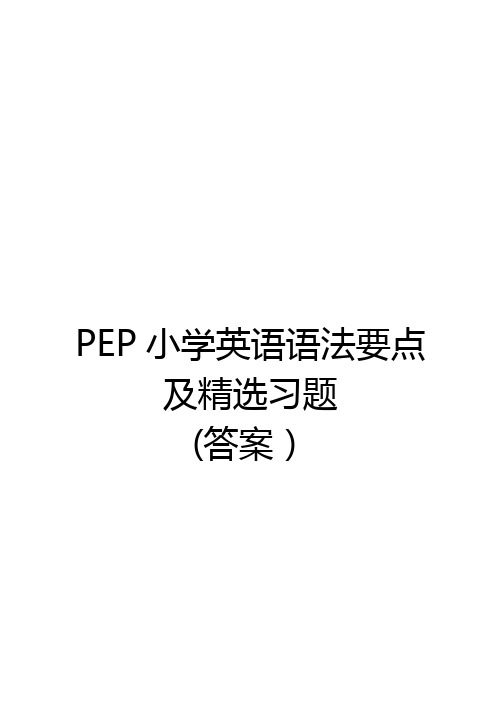
一、写出下列动词的现在分词:
play_playing_run__running__swim __swimming__make__making___
go___going___ski__skiing___
read_reading_have__having__sing __singing___dance_dancing__
3.What are you doingin the playground?
4.What isTomdoing in his study?
四、一般将来时
一、填空。
1。我打算明天和朋友去野炊。
Iamgoingtohave a picnic with my friends。
Iwillhave a picnic with my friends。
come - camehave - hadeat - atetake - took
run - ransing - sangput - putmake - made
read - readwrite - wrotedraw - drewdrink - drank
fly - flewride - rodespeak - spokesweep - swept
19. Davidwill givea puppet show next Monday.
20. Iis planningfor my study now
五、一般过去时
am,is - wasare - weredo - didsee - saw
say - saidgive - gaveget - gotgo - went
looklooksdrawdrawsdropdropsgivegives
小学英语语法练习题及答案

小学英语语法练习题及答案在小学阶段,英语语法的学习是非常重要的,它能帮助学生构建语言基础,并为日后的深入学习打下坚实的基础。
以下是一些小学英语语法练习题及答案,适合家长或老师用来检验学生的学习成果。
练习题1:名词的单复数1. This is a _______ (book).2. There are many _______ (apple) on the table.3. The _______ (child) are playing outside.答案1:1. book2. apples3. children练习题2:动词的现在时态1. I _______ (go) to school every day.2. She _______ (have) a cat.3. They _______ (play) football on weekends.答案2:1. go2. has3. play练习题3:形容词的比较级和最高级1. Which is _______ (big), the sun or the moon?2. She is _______ (tall) than her brother.3. The tallest mountain in the world is _______ (tall).答案3:1. bigger2. taller3. the tallest练习题4:疑问句的构成1. _______ you like ice cream?2. _______ is your favorite color?3. _______ they going to the park?答案4:1. Do2. What3. Are练习题5:代词的使用1. This is _______ (I) book. (my)2. _______ (he) is my friend. (He)3. _______ (they) are very happy. (They)答案5:1. my2. He3. They练习题6:时态的一致性1. I _______ (am) a student and _______ (like) to read books.2. She _______ (was) at home yesterday and _______ (watch) TV.3. They _______ (will go) to the zoo tomorrow.答案6:1. am, like2. was, watched3. will go练习题7:情态动词的使用1. You _______ (must) finish your homework before you play.2. I _______ (can) speak English and Chinese.3. _______ (May) I borrow your pen?答案7:1. must2. can3. May练习题8:介词的使用1. The cat is _______ (in) the box.2. They are going _______ (to) the park.3. She is _______ (from) China.答案8:1. in2. to3. from结束语:通过这些练习题,学生可以加强对英语语法的理解和应用能力。
小学英语语法练习题及答案
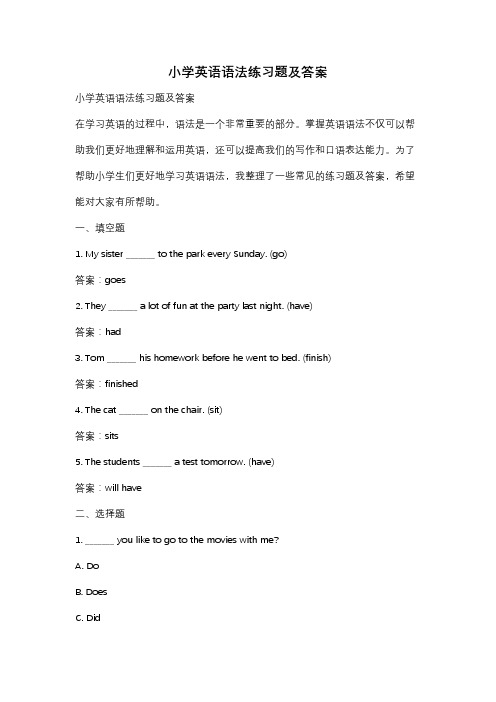
小学英语语法练习题及答案小学英语语法练习题及答案在学习英语的过程中,语法是一个非常重要的部分。
掌握英语语法不仅可以帮助我们更好地理解和运用英语,还可以提高我们的写作和口语表达能力。
为了帮助小学生们更好地学习英语语法,我整理了一些常见的练习题及答案,希望能对大家有所帮助。
一、填空题1. My sister _______ to the park every Sunday. (go)答案:goes2. They _______ a lot of fun at the party last night. (have)答案:had3. Tom _______ his homework before he went to bed. (finish)答案:finished4. The cat _______ on the chair. (sit)答案:sits5. The students _______ a test tomorrow. (have)答案:will have二、选择题1. _______ you like to go to the movies with me?A. DoB. DoesC. Did答案:A2. My mother _______ cooking dinner in the kitchen now.A. isB. amC. areD. be答案:A3. We _______ to the zoo last Sunday.A. goB. goesC. wentD. will go答案:C4. _______ she like playing basketball?A. DoB. DoesC. DidD. Will答案:B5. I _______ a new bike for my birthday.A. getC. gotD. will get答案:D三、改错题1. She goes to school by bus every day.答案:goes → go2. He have a lot of friends in his new school.答案:have → has3. They is playing soccer in the park now.答案:is → are4. I will go to the beach tomorrow if it will not rain.答案:will → does5. My brother and I likes to watch movies on weekends. 答案:likes → like四、连词成句1. you / to / the / park / go / do / on / weekends / ?答案:Do you go to the park on weekends?2. yesterday / to / the / we / movies / went / .答案:We went to the movies yesterday.3. is / reading / book / my / sister / a / now / .答案:My sister is reading a book now.4. have / time / do / you / what / to / ?答案:What do you have to do?5. will / the / party / at / have / we / tomorrow / house / our / .答案:We will have the party at our house tomorrow.通过这些练习题,我们可以巩固和运用所学的英语语法知识。
小学英语语法练习题及答案

小学英语语法练习题及答案一、名词练习1. 单复数名词- 单数名词变复数名词:- Book → Books- Child → Children- Foot → Feet2. 名词所有格- 表示所有关系的名词:- The cat's tail (猫的尾巴)- My father's car (我爸爸的车)答案:1.- Books- Children- Feet2.- The cat has a long tail.- His car is new.二、动词练习1. 动词的时态- 现在进行时:- She is reading a book.- 一般过去时:- They walked to school.2. 动词的第三人称单数- He plays football every day.答案:1.- She is reading a book now.- Yesterday, they walked to school. 2.- He plays football every day.三、形容词和副词练习1. 形容词比较级和最高级- 比较级:Bigger, faster- 最高级:The biggest, the fastest2. 副词的使用- 副词修饰动词:- She runs quickly.答案:1.- The cat is bigger than the dog.- This is the fastest car in the race.2.- She runs quickly to catch the bus.四、代词练习1. 人称代词- 主格代词:I, you, he, she, it- 宾格代词:me, you, him, her, it2. 物主代词- 形容词性物主代词:my, your, his, her, its - 名词性物主代词:mine, yours, his, hers, its答案:1.- I am going to the park. (主格)- Can you pass the ball to me? (宾格)2.- This is my book. (形容词性)- The book is mine. (名词性)五、介词练习1. 表示时间的介词- In, on, at- In the morning, on Monday, at 5 o'clock2. 表示地点的介词- In, on, at, to- In the classroom, on the desk, at the zoo, to the library答案:1.- I wake up in the morning.- We have a party on my birthday.- The meeting starts at 3 PM.2.- The cat is in the box.- The book is on the table.- We go to the park.六、疑问句练习1. 一般疑问句- Do you like apples?- Does she have a sister?2. 特殊疑问句- What is your name?- Where are you going?答案:1.- Yes, I do.- No, she doesn't.2.- My name is Tom.- I am going to the cinema.。
小学英语语法及习题 四大基本时态
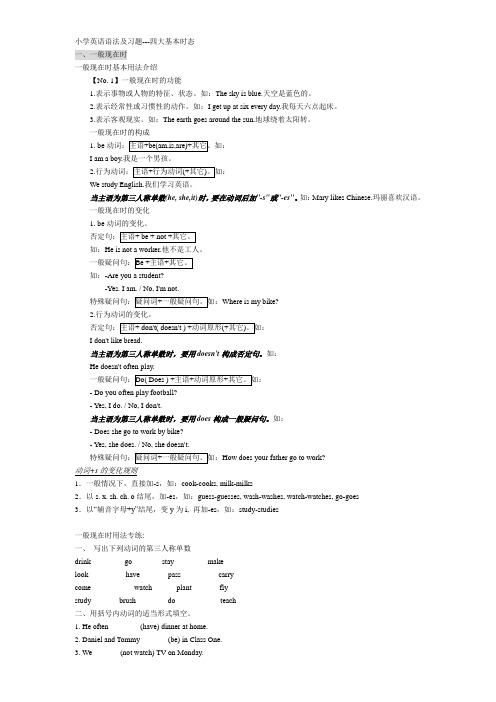
小学英语语法及习题---四大基本时态一、一般现在时一般现在时基本用法介绍【No. 1】一般现在时的功能1.表示事物或人物的特征、状态。
如:The sky is blue.天空是蓝色的。
2.表示经常性或习惯性的动作。
如:I get up at six every day.我每天六点起床。
3.表示客观现实。
如:The earth goes around the sun.地球绕着太阳转。
一般现在时的构成1. beI am a boy.我是一个男孩。
2.We study English.我们学习英语。
当主语为第三人称单数(he, she,it)时,要在动词后加"-s"或"-es"。
如:Mary likes Chinese.玛丽喜欢汉语。
一般现在时的变化1. be动词的变化。
如:He is not a worker.他不是工人。
如:-Are you a student?-Yes. I am. / No, I'm not.Where is my bike?2.行为动词的变化。
I don't like bread.当主语为第三人称单数时,要用doesn't构成否定句。
如:He doesn't often play.- Do you often play football?- Yes, I do. / No, I don't.当主语为第三人称单数时,要用does构成一般疑问句。
如:- Does she go to work by bike?- Yes, she does. / No, she doesn't.How does your father go to work?动词+s的变化规则1.一般情况下,直接加-s,如:cook-cooks, milk-milks2.以s. x. sh. ch. o结尾,加-es,如:guess-guesses, wash-washes, watch-watches, go-goes3.以“辅音字母+y”结尾,变y为i, 再加-es,如:study-studies一般现在时用法专练:一、写出下列动词的第三人称单数drink ________ go _______ stay ________ make ________look _________ have_______ pass_______ carry ____come________ watch______ plant_______ fly ________study_______ brush________ do_________ teach_______二、用括号内动词的适当形式填空。
(完整版)小学英语语法大全-附练习题(最新整理)

2. He has visited many country. ______________________
3. They are Englishs. ______________________________
4. This is Tom red bike. ____________________________
小学英语语法大全-附练习题 !!!!!!!!!!!! !!!!!!!!!!!!
Contents
第一章 名词 1. 名词的数 2. 名词的格 第二章 代词 1. 人称代词 2. 物主代词 第三章 冠词 与 数词 1. 冠词 2. 数词 第四章 一般现在时态 第五章 现在进行时态 第六章 句型 1. 陈述句 2. 疑问句 3. 祈使句 4. There be 句型与 have\ has 第七章 总结考试
四、改错 (圈出错处,在横线上改正过来)
1.There are some butterflys on the table. ________________________
2.This is Alice dress. ______________________
3.I like tomato very much. __________________
第二章 代词
一、人称代词
1.人称代词即表示“你、我、他、你们、我们、他们”等的词,它的人称、数和格的变化见下表:
数
人称
主格
宾格
单数
第一人称
I
me
第二人称
you
you
第三人称
he
him
she
her
it
it
复数
第一人称
We
小学二年级英语语法及练习题
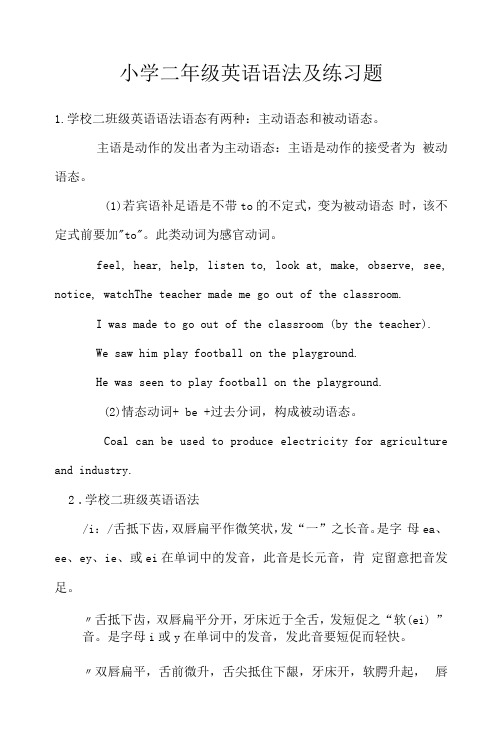
小学二年级英语语法及练习题1.学校二班级英语语法语态有两种:主动语态和被动语态。
主语是动作的发出者为主动语态:主语是动作的接受者为被动语态。
(1)若宾语补足语是不带to的不定式,变为被动语态时,该不定式前要加"to"。
此类动词为感官动词。
feel, hear, help, listen to, look at, make, observe, see, notice, watchThe teacher made me go out of the classroom.I was made to go out of the classroom (by the teacher).We saw him play football on the playground.He was seen to play football on the playground.(2)情态动词+ be +过去分词,构成被动语态。
Coal can be used to produce electricity for agriculture and industry.2.学校二班级英语语法/i:/舌抵下齿,双唇扁平作微笑状,发“一”之长音。
是字母ea、ee、ey、ie、或ei在单词中的发音,此音是长元音,肯定留意把音发足。
〃舌抵下齿,双唇扁平分开,牙床近于全舌,发短促之“软(ei) ”音。
是字母i或y在单词中的发音,发此音要短促而轻快。
〃双唇扁平,舌前微升,舌尖抵住下龈,牙床开,软腭升起,唇自然开放。
是字母a在闭音节或重读闭音节中的发音/e/舌近硬腭,舌尖顶下齿,牙床半开半合,作微笑状。
是字母e 或ea在单词中的发音/3:/舌上抬,唇成自然状态,口半开半闭,发“厄”之长音。
是字母er、ir、or或ur在单词中的发音〃舌上抬,唇成自然状态,口半开半闭,发“厄”之短音。
是字母a、0、u、e、or、er或ur在单词中的发音/a:/双唇张而不圆,牙床大开,舌后微升,舌尖向后升缩微离下齿,发阿之长音。
(完整版)小学英语语法一本全附练习题
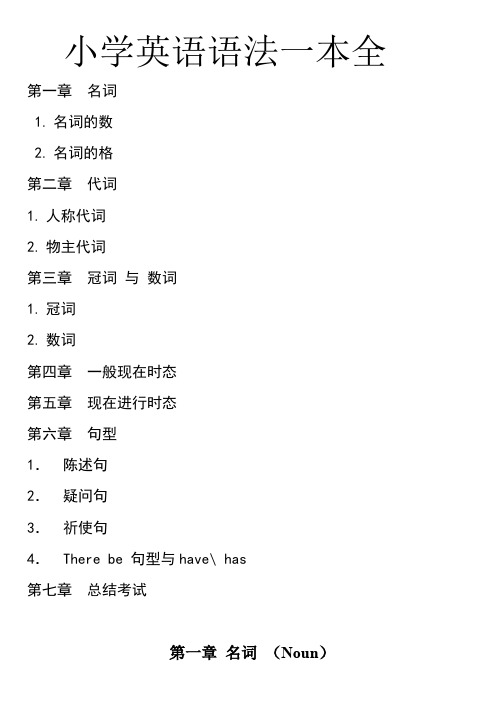
小学英语语法一本全第一章名词1.名词的数2.名词的格第二章代词1.人称代词2.物主代词第三章冠词与数词1.冠词2.数词第四章一般现在时态第五章现在进行时态第六章句型1.陈述句2.疑问句3.祈使句4.There be 句型与have\ has第七章总结考试名词的概念在生活中,我们会接触到各种各样的人和事物,用来表示这些人或事物名称的词就是名词。
一、名词的数名词的数指名词的单数和复数形式。
可数名词表示“一个”时用单数,“两个以上”时用复数;不可数名词表示量时,通常用“数词+单位+of+物质名词”的形式,如 a piece of bread (一片面包),变为复数时,只须将单位名词变为复数,如:two pieces of bread(两片面包)。
*名词复数的构成法则1. 一般情况下在词尾加 s. 词尾读音shop --- shops (商店) 在清辅音后读[ s ]bag --- bags (书包) 在浊辅音后读[ z ]window --- windows (窗户) 在元音后读[ z ]2. 以s, x, sh, ch 结尾的单词在词尾加es。
class --- classes (班级) 词尾读音[ iz ]box --- boxes (盒子)match --- matches (比赛)brush --- brushes (刷子)3. 以“辅音字母+y”结尾的词,变y为i 加es.story --- stories (故事) 词尾读音[ iz ]4. 以“元音字母+y”结尾的词,在词尾直接加skey --- keys 词尾读音[ z ]monkey --- monkeys5.以“o” 结尾的名词,复数一般在词尾加“s”, 但个别加“es”tomato --- tomatoes (西红柿) 词尾读音[ z ]potato --- potatoes (土豆)zoo --- zoos (动物园)photo --- photos (照片)*(以“o”结尾,复数加“es”)口诀:黑人(Negro)英雄(hero),左手拿着西红柿(tomato),右手拿着破土豆(potato),头顶一个大芒果(mango)。
小学英语基本语法练习题和答案

小学英语基本语法练习题和答案1. I am hungry. Please bring me some ______ .A. booksB. chairsC. cakes答案:C2. –What’s your ______ ?–I like listening to music.A. nameB. hobbyC. job答案:B3. I’ve got a toothache. I’m going to the______ .A. parkB. dentistC. teacher答案:B4. Miss Wang often gives her students ______ on how to learn English.A. some adviceB. pieces of advicesC. a few advicesD. little advice答案:A5. —Whose ruler is it? —Maybe it’s ______ .A. PeterB. PetersC. Mary’s答案:C6. —How far is your sister’s school from here?–It’s about two ______ drive.A. hour’sB. hours’C. hoursD. hour答案:B7. These are ______ . You can buy a pair for your father.A. man sockB. men sockC. men socksD. man socks答案:C8. Mr. White is from ______ . He’s______ . He speaks ______ .A. America, American, EnglishB. American, America, EnglishC. America, American, American答案:A- 冠词:9. There is ______ egg in the bowl.A. theB. aC./D. an答案:D10. In ______ winter, it often snows. It’s ______ best season.A. the, theB. a, theC.\, the答案:C11. Mary likes playing ______ basketball, but she doesn’t like playing ______ piano.A. /;/B. the; /C. the; theD. /;the答案:D12. I had ______ headache and stayed in ______ bed for a whole day yesterday.A. a, theB. the, aC./, /D. a, /答案:D13. There is ______ old tree in the picture. And there is ______ young man under ______ tree.A. an, a, theB. an ,an ,theC. the, a ,anD. a, the an答案:A14. Look, there’s ______ apple tree. ______ tree is very tall. You can see ______ cat under it.A. an, A, theB. an, The, aC. a, The, a答案:B- 代词:15. Please give ______ a cup of tea.A. IB. meC. myD. mine答案:B16. –Mom, ______ is my friend Jim.–Nice to meet you, Jim.A. this isB. that isC. it is答案:A17. –What is this in English?–______ an orange.A. This isB. It isC. That is答案:B18. –Excuse me, is this ______ pen?–Yes, please pass it to ______ .A. you; IB. your; IC. your; me答案:C19. The skirts are for ______ .A. you and meB. you and IC. I and youD. me and you答案:A20. Our classroom is brighter than ______ .A. yourB. yoursC. you答案:B21. This room is mine. That one is ______ .A. youB. yourC. yoursD. yourself答案:C22. This is our classroom. ______ is next to ______ .A. Your, ourB. Your, oursC. Yours, ours答案:B23. –Are these keys ______ ?–No, they aren’t. They are Li Ming’s.A. yourB. yoursC. you答案:B24. I ______ to school every day.A. goB. wentC. am going答案:A25. She ______ at home last night.A. wasB. isC. are答案:A26. They ______ in Beijing next week.A. are going to stayB. stayC. stayed答案:A27. I ______ a book last month.A. buyB. boughtC. am buying答案:B28. Look! The boys ______ football over there.A. playB. playedC. are playing答案:C29. She ______ to the park yesterday.A. goesB. wentC. go答案:B30. We often ______ TV at night.A. watchB. watchedC. are watching答案:A- 其他:31. –Is there ______ water in the glass?–Yes, there is.A. someB. anyC. a lot答案:B32. There ______ a pen and two pencils in the pencil box.A. isB. areC. be答案:A33. –Can you play football?–No, I ______.A. canB. can’tC. am not答案:B34. –______ do you go to school?–By bike.A. HowB. WhatC. Where答案:A35. My brother likes ______ very much.A. swimB. swimmingC. swims答案:B36. –______ are you?–I’m fine, thank you.A. HowB. WhatC. Who答案:A37. –______ is your book?–It’s on the desk.A. WhatB. WhereC. How答案:B38. –______ color is your bag?–It’s black.A. WhatB. WhereC. How答案:A39. –______ are these books?–Twenty yuan.A. How muchB. How manyC. What答案:A40. –______ do you like spring? –Because I can fly kites.A. WhyB. WhatC. Which答案:A— 11 —。
小学英语语法及练习题
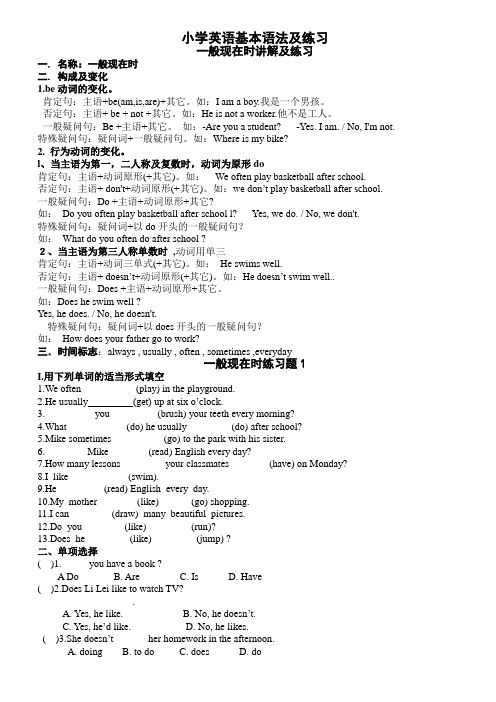
小学英语基本语法及练习一般现在时讲解及练习一. 名称:一般现在时二. 构成及变化1.be动词的变化。
肯定句:主语+be(am,is,are)+其它。
如:I am a boy.我是一个男孩。
否定句:主语+ be + not +其它。
如:He is not a worker.他不是工人。
一般疑问句:Be +主语+其它。
如:-Are you a student? -Yes. I am. / No, I'm not. 特殊疑问句:疑问词+一般疑问句。
如:Where is my bike?2. 行为动词的变化。
l、当主语为第一,二人称及复数时,动词为原形do肯定句:主语+动词原形(+其它)。
如:We often play basketball after school.否定句:主语+ don't+动词原形(+其它)。
如:we don’t play basketball after school.一般疑问句:Do +主语+动词原形+其它?如:Do you often play basketball after school l? Yes, we do. / No, we don't.特殊疑问句:疑问词+以do开头的一般疑问句?如:What do you often do after school ?2、当主语为第三人称单数时,动词用单三肯定句:主语+动词三单式(+其它)。
如:He swims well.否定句:主语+ doesn’t+动词原形(+其它)。
如:He doesn’t swim well..一般疑问句:Does +主语+动词原形+其它。
如:Does he swim well ?Yes, he does. / No, he doesn't.特殊疑问句:疑问词+以does开头的一般疑问句?如:How does your father go to work?三.时间标志:always , usually , often , sometimes ,everyday一般现在时练习题1I.用下列单词的适当形式填空1.We often___________(play) in the playground.2.He usually_________(get) up at six o’clock.3.__________you _________(brush) your teeth every morning?4.What____________(do) he usually_________(do) after school?5.Mike sometimes __________(go) to the park with his sister.6.________ Mike________(read) English every day?7.How many lessons_________your classmates________(have) on Monday?8.I like ___________ (swim).9.He _________(read) English every day.10.My mother________(like) ______(go) shopping.11.I can ________(draw) many beautiful pictures.12.Do you ________(like)_________(run)?13.Does he_________(like)_________(jump) ?二、单项选择( )1._____ you have a book ?A Do B. Are C. Is D. Have( )2.Does Li Lei like to watch TV?______________.A. Yes, he like.B. No, he doesn’t.C. Yes, he’d like.D. No, he likes.( )3.She doesn’t ______ her homework in the afternoon.A. doingB. to doC. doesD. do( )4.How ____ Mr. Smith ______ to England?A. do, goB. is , goC. does, goD. does , goes( )5. _____ she ______ home at six every day?A. Is , leaveB. Does , leaveC. Is , leavesD. Does , left三、按要求完成下列各题1.Tomorrow is Saturday.(变成一般疑问句)_________ ________ Saturday ?2.Does he play basketball every weekend? (肯定回答)Yes, ______ _______.3.She looks like her sister.(变一般疑问句)_____ she ______ like her sister ?4.Peter and Sam look the same.(一般疑问句)______ they _____ the same ?5.Do they always go to the movie (电影院) on Sundays ? (否定回答)No, _______ _______.现在进行时态精讲精练1.名称:现在进行时例:I am reading an English book now. 我现在正在读一本英语书。
小学英语语法练习题及答案

小学英语语法练习题及答案小学英语语法练习题及答案【篇一:小学英语语法及练习题--名词】定义名词可以分为专有名词和普通名词,专有名词是某个(些)人,地方,机构等专有的名称,如beijing,china等。
普通名词是一类人或东西或是一个抽象概念的名词,如:book,sadness等。
普通名词又可分为下面四类:1)个体名词:表示某类人或东西中的个体,如:gun。
2)集体名词:表示若干个个体组成的集合体,如:family。
4)抽象名词:表示动作、状态、品质、感情等抽象概念,如:work。
个体名词和集体名词可以用数目来计算,称为可数名词,物质名词和抽象名词一般无法用数目计算,称为不可数名词。
2. 名词复数的规则变化(情况,构成方法,读音,例词)a. 一般情况在名词后加-s清辅音后读/s/map-maps浊辅音和元音后读 /z/bag-bags /car-carsb. 以s, sh, ch, x等结尾的名词加-es读 /iz/bus-buses/ watch-watches/brush-brushes/box-boxesc. 以ce, se, ze,等结尾加 -s读 /iz/license-licensesd. 以辅音字母+y结尾的名词把变y 为i再加es读 /z/baby---babiese. 以o 结尾的名词,变复数时:1). 加s,如: photo---photos piano---pianosradio---radioszoo---zoos;2). 加es,如:potato--potatoes tomato--tomatoes3). 上述a和b两种方法均可,如zero---zeros / zeroes。
f. 以f或fe 结尾的名词变复数时:1). 加s,如: belief---beliefsroof---roofssafe---safes gulf---gulfs2). 去f, fe 加ves,如:half---halvesknife---knives leaf---leaves wolf---wolveswife---wives life---lives thief---thieves3). 上述a和b两种方法均可,如handkerchief: handkerchiefs / handkerchieves。
完整版)小学英语语法及练习题
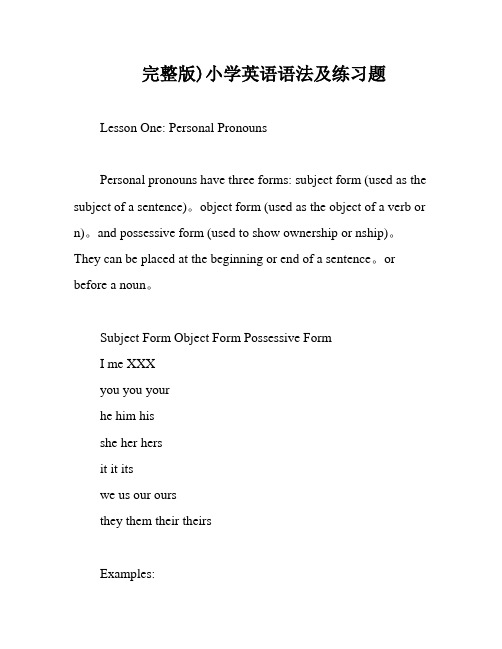
完整版)小学英语语法及练习题Lesson One: Personal PronounsPersonal pronouns have three forms: subject form (used as the subject of a sentence)。
object form (used as the object of a verb or n)。
and possessive form (used to show ownership or nship)。
They can be placed at the beginning or end of a sentence。
or before a noun。
Subject Form Object Form Possessive FormI me XXXyou you yourhe him hisshe her hersit it itswe us our oursthey them their theirsExamples:1.Are these your pencils。
Yes。
they are ours.2.Whose is this pencil。
It's XXX.3.I love them very much.4.XXX.5.Miss Li often looks after her XXX.6.Are these their bags。
No。
they XXX.7.That is not my kite。
That kite is very small。
but mine is very big.8.The dress is hers。
Give it to her.9.Is this your watch。
No。
it's not XXX.1.This bike is my sister's。
It belongs to her.2.This isn't my book。
小学英语语法及练习题资料
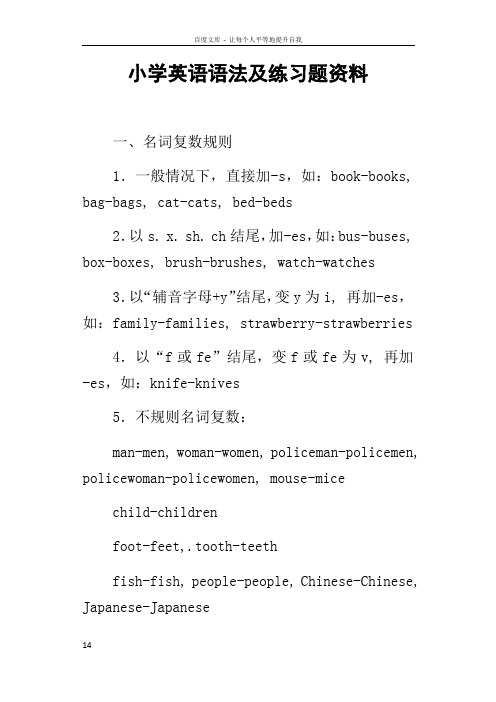
小学英语语法及练习题资料一、名词复数规则1.一般情况下,直接加-s,如:book-books, bag-bags, cat-cats, bed-beds2.以s. x. sh. ch结尾,加-es,如:bus-buses, box-boxes, brush-brushes, watch-watches 3.以“辅音字母+y”结尾,变y为i, 再加-es,如:family-families, strawberry-strawberries 4.以“f或fe”结尾,变f或fe为v, 再加-es,如:knife-knives5.不规则名词复数:man-men, woman-women, policeman-policemen, policewoman-policewomen, mouse-micechild-childrenfoot-feet,.tooth-teethfish-fish, people-people, Chinese-Chinese, Japanese-Japanese写出下列各词的复数I _________him _________this ___________her ______watch _______child _______photo ________diary ______day________ foot________ book_______ dress ________tooth_______ sheep ______box_______ strawberry _____thief _______yo-yo ______ peach______ sandwich ______man______ woman_______ paper_______ juice___________water________ milk________ rice__________ tea__________二、一般现在时一般现在时基本用法介绍【No. 1】一般现在时的功能1.表示事物或人物的特征、状态。
- 1、下载文档前请自行甄别文档内容的完整性,平台不提供额外的编辑、内容补充、找答案等附加服务。
- 2、"仅部分预览"的文档,不可在线预览部分如存在完整性等问题,可反馈申请退款(可完整预览的文档不适用该条件!)。
- 3、如文档侵犯您的权益,请联系客服反馈,我们会尽快为您处理(人工客服工作时间:9:00-18:30)。
小学英语语法及练习题资料一、名词复数规则1.一般情况下,直接加-s,如book-booksbag-bagscat-catsbed-beds2.以s.x.sh.ch结尾,加-es,如bus-busesbox-boxesbrush-brusheswatch-watches 3.以“辅音字母+y”结尾,变y为i再加-es,如family-familiesstrawberry-strawberries4.以“f或fe”结尾,变f或fe为v再加-es,如knife-knives5.不规则名词复数man-menwoman-womenpoliceman-policemenpolicewoman-policewomenmouse-mice child-childrenfoot-feet.tooth-teethfish-fishpeople-peopleChinese-ChineseJapanese-Japanese写出下列各词的复数I_________him_________this___________her______watch_______child_______photo________diary______day________foot________book_______dress________tooth_______sheep______box_______strawberry_____thief_______yo-yo______peach______sandwich______man______woman_______paper_______juice___________water________milk________rice__________tea__________二、一般现在时一般现在时基本用法介绍【No.1】一般现在时的功能1.表示事物或人物的特征、状态。
如Theskyisblue.天空是蓝色的。
2.表示经常性或习惯性的动作。
如Igetupatsixeveryday.我每天六点起床。
3.表示客观现实。
如Theearthgoesaroundthesun.地球绕着太阳转。
一般现在时的构成1.be动词主语+be(amisare)+其它。
如Iamaboy.我是一个男孩。
2.行为动词主语+行为动词(+其它)。
如WestudyEnglish.我们学习英语。
当主语为第三人称单数(hesheit)时,要在动词后加-s或-es。
如MarylikesChinese.玛丽喜欢汉语。
一般现在时的变化1.be动词的变化。
否定句主语+be+not+其它。
如Heisnotaworker.他不是工人。
一般疑问句Be+主语+其它。
如-Areyouastudent?-Yes.Iam./NoI'mnot.特殊疑问句疑问词+一般疑问句。
如Whereismybike?2.行为动词的变化。
否定句主语+don't(doesn't)+动词原形(+其它)。
如Idon'tlikebread.当主语为第三人称单数时,要用doesn't构成否定句。
如Hedoesn'toftenplay.一般疑问句Do(Does)+主语+动词原形+其它。
如-Doyouoftenplayfootball?-YesIdo./NoIdon't.当主语为第三人称单数时,要用does构成一般疑问句。
如-Doesshegotoworkbybike?-Yesshedoes./Noshedoesn't.特殊疑问句疑问词+一般疑问句。
如Howdoesyourfathergotowork?动词+s的变化规则1.一般情况下,直接加-s,如cook-cooksmilk-milks2.以s.x.sh.ch.o结尾,加-es,如guess-guesseswash-washeswatch-watchesgo-goes 3.以“辅音字母+y”结尾,变y为i再加-es,如study-studies一般现在时用法专练:一、写出下列动词的第三人称单数drink________go_______stay________make________look_________have_______pass_______carry____e________watch______plant_______fly________study_______brush________do_________teach_______1.Heoften________(have)dinnerathome.2.DanielandTommy_______(be)inClassOne.3.We_______(notwatch)TVonMonday.4.Nick_______(notgo)tothezooonSunday.5.______they________(like)theWorldCup?6.What_______theyoften_______(do)onSaturdays?7._______yourparents_______(read)newspaperseveryday?8.Thegirl_______(teach)usEnglishonSundays.9.SheandI________(take)awalktogethereveryevening.10.There________(be)somewaterinthebottle.11.Mike_______(like)cooking.12.They_______(have)thesamehobby.13.Myaunt_______(look)afterherbabycarefully.14.Youalways_______(do)yourhomeworkwell.15.I_______(be)ill.I’mstayinginbed.16.She_______(go)toschoolfromMondaytoFriday.17.LiuTao_______(do)notlikePE.18.Thechildoften_______(watch)TVintheevening.19.SuHaiandSuYang_______(have)eightlessonsthisterm.20.-Whatday_______(be)ittoday?-It’sSaturday.三、按照要求改写句子1.DanielwatchesTVeveryevening.(改为否定句)___________________________________________________2.Idomyhomeworkeveryday.(改为一般疑问句,作否定回答)________________________________________________________3.Shelikesmilk.(改为一般疑问句,作肯定回答)___________________________4.Amylikesplayingputergames.(改为一般疑问句,作否定回答)___________________________________________________5.Wegotoschooleverymorning.(改为否定句)_______________________________________________________6.HespeaksEnglishverywell.(改为否定句)___________________________________________________7.Iliketakingphotosinthepark.(对划线部分提问)________________________________________________________8.JohnesfromCanada.(对划线部分提问)___________________________________________________9.Sheisalwaysagoodstudent.(改为一般疑问句,作否定回答)________________________________________________________10.SimonandDaniellikegoingskating.(改为否定句)___________________________________________________五、改错(划出错误的地方,将正确的写在横线上)1.IsyourbrotherspeakEnglish?__________________2.Doeshelikesgoingfishing?__________________3.Helikesplaygamesafterclass.__________________4.Mr.WuteachsusEnglish.__________________5.Shedon’tdoherhomeworkonSundays._________________三、现在进行时1.现在进行时表示现在正在进行或发生的动作,也可表示当前一段时间内的活动或现阶段正在进行的动作。
2.现在进行时的肯定句基本结构为be+动词ing.3.现在进行时的否定句在be后加not。
4.现在进行时的一般疑问句把be动词调到句首。
5.现在进行时的特殊疑问的基本结构为疑问词+be+主语+动词ing?但疑问词当主语时其结构为疑问词+be+动词ing?动词加ing的变化规则1.一般情况下,直接加ing,如cook-cooking2.以不发音的e结尾,去e加ing,如make-makingtaste-tasting3.如果末尾是一个元音字母和一个辅音字母,双写末尾的辅音字母,再加ing,如run-runningstop-stopping现在进行时专项练习一、写出下列动词的现在分词play________run__________swim_________make__________go_________like________write_________ski___________read________have_________sing________dance_________put_________see________buy_________love____________live_______take_________e________get_________stop_________sit________begin________shop___________二、用所给的动词的正确形式填空1.Theboy__________________(draw)apicturenow.2.Listen.Somegirls_______________(sing)intheclassroom.3.Mymother_________________(cook)somenicefoodnow.4.What_____you______(do)now?5.Look.They_______________(have)anEnglishlesson.6.They____________(notwater)theflowersnow.7.Look!thegirls________________(dance)intheclassroom.8.Whatisourgranddaughterdoing?She_________(listen)tomusic.9.It’s5o’clocknow.We_____________(have)suppernow10.______Helen____________(wash)clothes?Yessheis.1.Theyaredoinghousework.(分别改成一般疑问句和否定句)__________________________________________________________________________________________________________________________2.Thestudentsarecleaningtheclassroom.(改一般疑问句并作肯定和否定回答)__________________________________________________________________________________________________________________________________3.I’mplayingthefootballintheplayground.(对划线部分进行提问)_________________________________________________________________4.Tomisreadingbooksinhisstudy.(对划线部分进行提问)四、将来时一、概念表示将要发生的动作或存在的状态及打算、计划或准备做某事。
